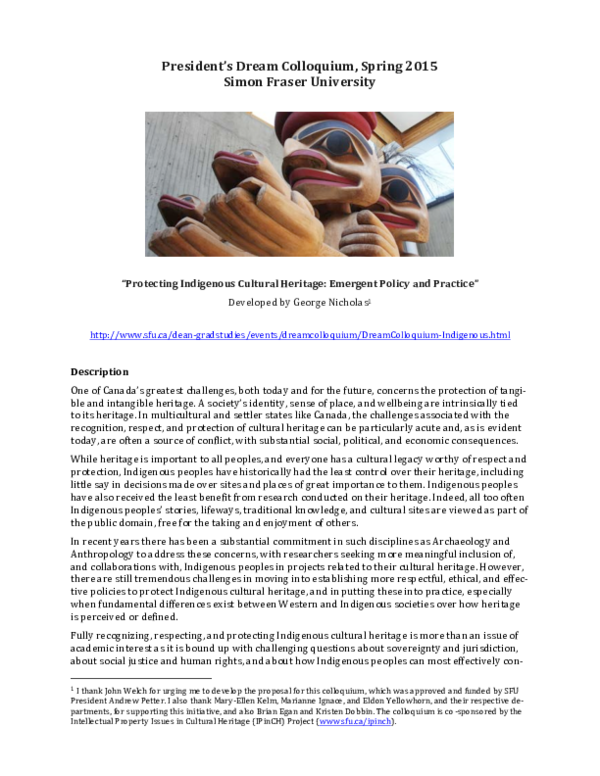The Struggle For Data Control: Indigenous Scientists Protecting Cultural Heritage

Table of Contents
The Importance of Indigenous Data Sovereignty
Defining Indigenous Data Sovereignty
Indigenous data sovereignty is not simply about data ownership; it's about self-determination. It's about recognizing Indigenous communities as the rightful custodians of their own information, ensuring their voices are heard, and their knowledge is respected and protected from exploitation. This contrasts sharply with Western data governance models, which often prioritize economic gain or scientific advancement over the cultural rights and well-being of Indigenous peoples. The ethical implications of disregarding Indigenous perspectives on data ownership are profound, potentially leading to cultural appropriation, misrepresentation, and the erosion of traditional knowledge systems.
- Right to collect and manage data: Indigenous communities should have the primary right to collect data related to their lands, cultures, and histories.
- Control over data storage, access, and use: Indigenous communities must control how their data is stored, who has access to it, and how it is used. This includes the right to restrict access and prevent unauthorized use.
- Benefit-sharing mechanisms: Any benefits derived from the use of Indigenous data should be shared equitably with the communities that contributed it.
- Protection against misrepresentation and misuse: Indigenous data must be protected from misrepresentation and used in ways that are consistent with Indigenous values and perspectives.
Disregarding these principles can lead to the commodification of Indigenous knowledge and the perpetuation of harmful stereotypes. For instance, genetic data collected without proper consent and benefit-sharing agreements could be used for purposes unrelated to the well-being of the community, leading to ethical breaches and potential harm.
Challenges Faced by Indigenous Scientists
Lack of Resources and Infrastructure
Indigenous scientists face significant hurdles in protecting their cultural heritage through data control. A persistent lack of resources and infrastructure significantly hampers their ability to effectively manage and protect their data.
- Funding disparities compared to mainstream research: Indigenous research projects often receive significantly less funding than mainstream research initiatives, limiting their capacity to invest in data management systems and training.
- Limited access to advanced data management tools and technologies: Many Indigenous communities lack access to the sophisticated data management tools and technologies necessary for secure data storage, analysis, and protection.
- Lack of training in data ethics and governance: A lack of training and education in data ethics and governance further exacerbates the challenges faced by Indigenous researchers, leaving them vulnerable to exploitation.
These challenges are particularly acute in remote communities with limited internet access and technological infrastructure. For example, researchers in the Arctic face difficulties storing and managing large datasets related to environmental monitoring, cultural practices, and traditional ecological knowledge due to limited bandwidth and unreliable internet connections.
Strategies for Protecting Indigenous Cultural Heritage
Community-Based Participatory Research
A crucial strategy for protecting Indigenous cultural heritage is to embrace community-based participatory research (CBPR). This approach ensures that Indigenous communities are actively involved in all stages of research, from defining research questions to data analysis and dissemination.
- Free, Prior, and Informed Consent (FPIC) protocols: FPIC protocols are essential for ensuring that Indigenous communities provide their free, prior, and informed consent before any data collection or research takes place.
- Community ownership of data and research outcomes: Indigenous communities must retain ownership of the data and research outcomes, ensuring that the knowledge generated benefits them directly.
- Capacity building initiatives: Investment in capacity building initiatives is critical for empowering Indigenous communities to manage their own data and conduct their own research.
Successful examples of community-based research projects demonstrate the effectiveness of this approach. The involvement of Indigenous communities ensures culturally appropriate methodologies, reduces the risk of misrepresentation, and empowers communities to protect their own data.
The Role of Policy and Legislation
National and International Frameworks
Strengthening legal and policy frameworks is vital for supporting Indigenous data sovereignty. Existing national and international frameworks provide a foundation, but further action is needed.
- UN Declaration on the Rights of Indigenous Peoples (UNDRIP): UNDRIP recognizes the rights of Indigenous peoples to control their traditional knowledge and resources, including data.
- National legislation concerning data protection and Indigenous rights: Many countries are developing or strengthening legislation to protect Indigenous data rights, but these laws need to be effectively implemented.
- International collaborations for data sharing and governance: International collaborations can facilitate the sharing of best practices and the development of common standards for Indigenous data governance.
However, the implementation of these frameworks often faces challenges. Inconsistencies between national laws and international agreements, a lack of awareness among researchers and policymakers, and limited resources to enforce these regulations pose significant obstacles.
Conclusion
Protecting Indigenous cultural heritage through effective Indigenous data control mechanisms is paramount. Indigenous scientists face significant challenges, including limited resources, technological constraints, and inadequate legal frameworks. However, community-based participatory research, coupled with strong policy and legislative support, offers a pathway forward. We must champion Indigenous data sovereignty, support Indigenous-led research initiatives, demand ethical data practices, and advocate for policy changes that prioritize Indigenous data control. By working collaboratively and respecting the rights of Indigenous communities, we can ensure that invaluable cultural knowledge is preserved for future generations. Let us act now to protect and respect Indigenous data and cultural heritage.

Featured Posts
-
 Winterwatch A Comprehensive Guide To Winter Wildlife
May 13, 2025
Winterwatch A Comprehensive Guide To Winter Wildlife
May 13, 2025 -
 Fox News Faces Defamation Lawsuit From Ray Epps Over January 6th Narrative
May 13, 2025
Fox News Faces Defamation Lawsuit From Ray Epps Over January 6th Narrative
May 13, 2025 -
 Uppgifter Vem Tar Oever Atalanta
May 13, 2025
Uppgifter Vem Tar Oever Atalanta
May 13, 2025 -
 Tensions Rise Tory Lanez And His Lawyer Clash In Megan Thee Stallion Case
May 13, 2025
Tensions Rise Tory Lanez And His Lawyer Clash In Megan Thee Stallion Case
May 13, 2025 -
 Eva Longorias Lavish 50th Birthday Celebration In Miami
May 13, 2025
Eva Longorias Lavish 50th Birthday Celebration In Miami
May 13, 2025
